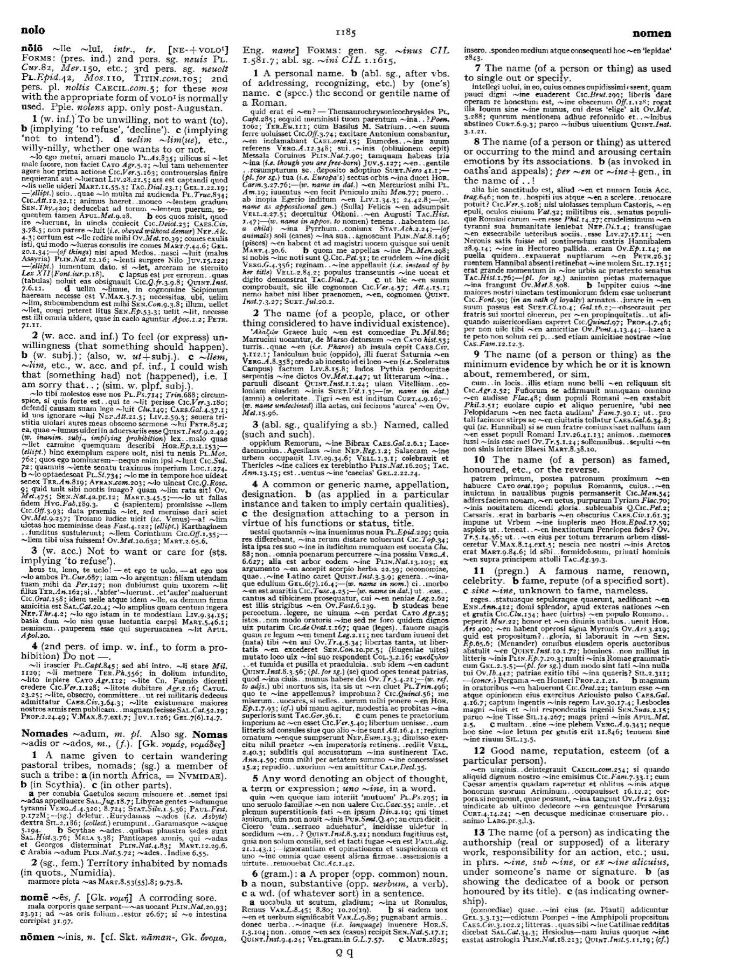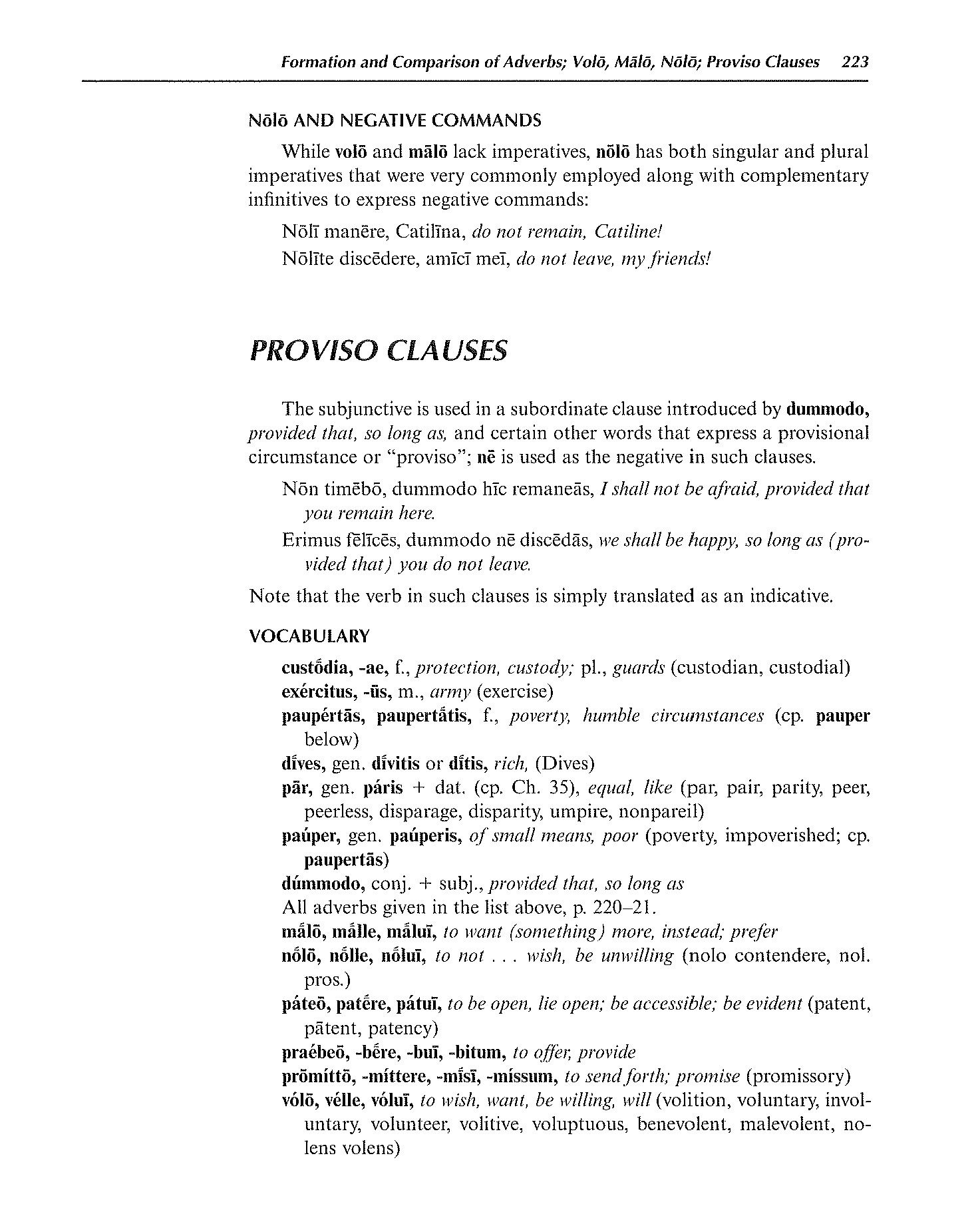
page_listing.tpl
page_subListingDetails.tpl
sub_listingDetails_style1.tpl
sub_listingDetails.title.tpl
nōlle to be unwilling
nōlle is a Latin Verb that primarily means to be unwilling.
Definitions for nōlle
Wheelock's Latin
Verb
- 1
to not ... wish, be unwilling
English derivatives:
nolo contendere nol. pros.
Oxford Latin Dictionary
Verb
- 1
(w. inf.) To be unwilling, not to want (to). (b) (implying ; 'to refuse', 'decline'). (c) (implying 'not to intend'). (d) uelim ~lim(ue), etc., willy-nilly, whether one wants to or not.
- 2
(w. acc. and inf.) To feel (or express) unwillingness (that something should happen). (b) (w. subj.); (also, w. ut+subj.). (c) ~llem, ~lim, etc., w. acc. and pf. inf., I could wish that (something had) not (happened), i.e. I am sorry that..; (sim. w. plpf. subj.).
- 3
(w. acc.) Not to want or care for (sts. implying 'to refuse').
- 4
(2nd pers. of imp. w. inf., to form a prohibition) DO not --.
Sentences with nōlle
Latin to English
Lais anus Veneri speculum dedico; dignum habeat se aeterna aeternum forma ministerium. at mihi nullus in hoc usus, quia cernere talem, qualis sum, nolo, qualis eram, nequeo. (De Laide dicante Veneri speculum suum. Epigrammata, LXV)Compare I, the aged Lais, dedicate my mirror to Venus; let eternal beauty receive the eternal tribute it deserves. The mirror is no longer of any use to me, for I do not want to see myself as I am, and I cannot see myself as I was.
Nolo ad vester lex atque institutum exigo is qui Lacedaemon fio.Compare Do not measure by your laws and institutions what is done at Lacedaemon.
Id ego nolo et uno hoc non muto omnia.Compare I would not trade being myself for the whole world.
Nec nolo quisquam ego similis evado civis.Compare Nor are we unwilling that any citizen should turn out like ourselves.
Dico ex is quidam Athenienses scio, qui rectus sum, sed facio nolo.Compare One of them said that the Athenians knew what was right, but were unwilling to practise it.
Conjugation table for nōlle
Cactus2000
| ACTIVE | |
| Indicative present | Indicative imperfect |
| nōlō nōn vīs nōn vult nōlumus nōn vultis nōlunt | nōlēbam nōlēbās nōlēbat nōlēbāmus nōlēbātis nōlēbant |
| Indicative perfect | Indicative pluperfect |
| nōluī nōluistī nōluit nōluimus nōluistis nōluērunt / nōluēre | nōlueram nōluerās nōluerat nōluerāmus nōluerātis nōluerant |
| Indicative future | Indicative future perfect |
| nōlam nōlēs nōlet nōlēmus nōlētis nōlent | nōluerō nōlueris nōluerit nōluerimus nōlueritis nōluerint |
| Subjunctive present | Subjunctive imperfect |
| nōlim nōlīs nōlit nōlīmus nōlītis nōlint | nōllem nōllēs nōllet nōllēmus nōllētis nōllent |
| Subjunctive perfect | Subjunctive pluperfect |
| nōluerim nōlueris nōluerit nōluerimus nōlueritis nōluerint | nōluissem nōluissēs nōluisset nōluissēmus nōluissētis nōluissent |
Infinitive present nōlle Infinitive perfect nōluisse Infinitive future - | Imperative present nōlī nōlīte Imperative future nōlītō nōlītō nōlītōte nōluntō |
| PARTICIPLE | ||
| Participle present active | ||
| nōlēns | nōlentēs | |
| nōlēns | nōlentēs | |
| nōlēns | nōlentēs | |
| nōlēns | nōlentēs | |
| nōlēns | nōlentēs | |
| Participle future active | ||
| - | - | |
| - | - | |
| - | - | |
| - | - | |
| - | - | |
| Participle perfect passive | ||
| - | - | |
| - | - | |
| - | - | |
| - | - | |
| - | - | |
| Gerundive | ||
| - | - | |
| - | - | |
| - | - | |
| - | - | |
| - | - | |
| Gerund | Supine | |
| - | - | |
| - | - | |
| - | ||
| - | ||
| - | ||
| PARTICIPLE | ||
| Participle present active | ||
| Nom. | nōlēns | nōlentēs |
| Gen. | nōlentis | nōlentium |
| Dat. | nōlentī | nōlentibus |
| Acc. | nōlentem | nōlentēs |
| Abl. | nōlente | nōlentibus |
| Participle future active | ||
| Nom. | - | - |
| Gen. | - | - |
| Dat. | - | - |
| Acc. | - | - |
| Abl. | - | - |
| Participle perfect passive | ||
| Nom. | - | - |
| Gen. | - | - |
| Dat. | - | - |
| Acc. | - | - |
| Abl. | - | - |
| Gerundive | ||
| Nom. | - | - |
| Gen. | - | - |
| Dat. | - | - |
| Acc. | - | - |
| Abl. | - | - |
| Gerund | Supine | |
| Nom. | - | - |
| Gen. | - | - |
| Dat. | - | |
| Acc. | - | |
| Abl. | - | |
Data sources
Notes
- Definitions
- Frederick M. Wheelock, Wheelock's Latin, 6th ed., rev. Richard A. LaFleur (New York, NY: HarperCollins Publishers, 2005): 223.
- P. G. W. Glare, Oxford Latin Dictionary, Vols. 1-8 (Oxford: Clarendon Press, 1982): 1185.
- Word frequencies
- Christopher Francese, "Latin Core Vocabulary," Dickinson College Commentaries, last modified 2014, http://dcc.dickinson.edu.
- Paul B. Diederich, The Frequency of Latin Words and Their Endings, PhD diss., (Columbia University, 1939).
- Louis Delatte, Suzanne Govaerts, Joseph Denooz, and Etienne Evrard, Dictionnaire fréquentiel et index inverse de la langue latine [Frequency Dictionary and Inverse Index of the Latin Language] (Liège, Belgium: Laboratoire d'analyse statistique des langues anciennes de l'Université de Liège [L.A.S.L.A.], 1981): 122.
Bibliography
Allen, Joseph H. Allen and Greenough's New Latin Grammar for Schools and Colleges: Founded on Comparative Grammar. Edited by James B. Greenough, George L. Kittredge, Albert A. Howard, and Benjamin L. D'Ooge. Boston, MA: Ginn & Company, 1903.
Crystal, David. A Dictionary of Linguistics and Phonetics. 6th ed. Oxford, UK: Blackwell Publishing, 2008.
Delatte, Louis, Suzanne Govaerts, Joseph Denooz, and Etienne Evrard. Dictionnaire fréquentiel et index inverse de la langue latine [Frequency Dictionary and Inverse Index of the Latin Language]. Liège, Belgium: Laboratoire d'analyse statistique des langues anciennes de l'Université de Liège (L.A.S.L.A.), 1981.
Diederich, Paul B. The Frequency of Latin Words and Their Endings. PhD diss., Columbia University, 1939.
Francese, Christopher. "Latin Core Vocabulary." Dickinson College Commentaries. Last modified 2014. http://dcc.dickinson.edu/latin-vocabulary-list.
Gildersleeve, Basil L., and Gonzales Lodge. Gildersleeve's Latin Grammar: Third Edition, Revised, and Enlarged. 3rd ed. London, England: Macmillan and Co., 1903.
Glare, Peter G.W. Oxford Latin Dictionary. Vols. 1-8. Oxford, England: Clarendon Press, 1982.
Krüger, Bernd. "Latin Conjugation Tables." Cactus2000. Accessed May 5, 2023. https://latin.cactus2000.de/index.en.php.
Pierson, Nick. "Sound of Text." Accessed October 26, 2019. https://soundoftext.com.
Wheelock, Frederick M. Wheelock's Latin. 6th ed. Revised by Richard A. LaFleur. New York, NY: HarperCollins Publishers, 2005.
Wiktionary Contributors. "Victionarium." Wikimedia Foundation, Inc. Updated March 18, 2019. https://la.wiktionary.org/wiki/Victionarium:Pagina_prima.
Citation
Chicago (17th ed.)
Allo Contributors. "nōlō, nōlle, nōluī (v.) - Latin Word Definition." Allo Latin Dictionary. Last modified . Accessed February 19, 2026. http://ancientlanguages.org/latin/dictionary/nolo-nolle-nolui.
Entry created on . Last updated on .







